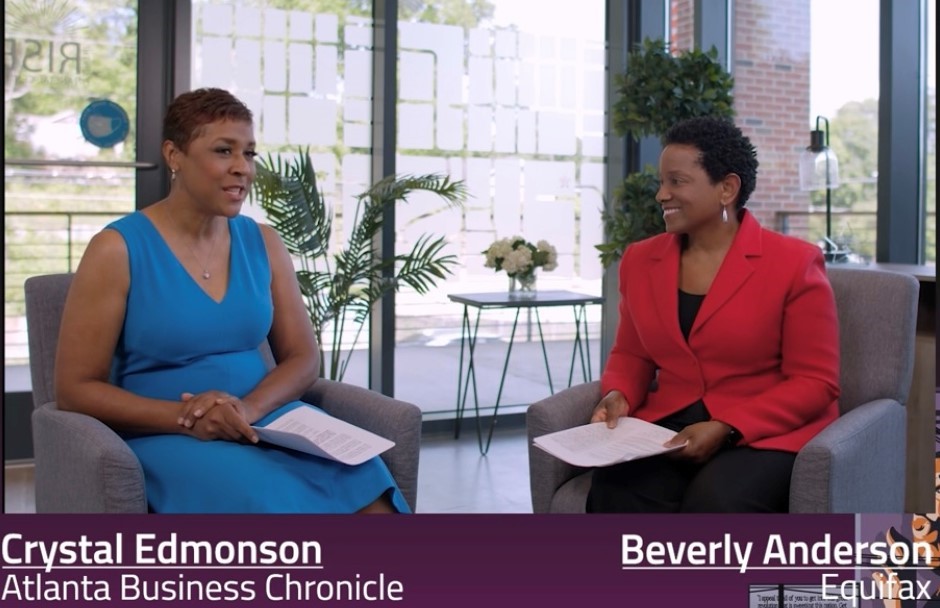Building Credit and Hope Through Financial Inclusion
Fintech South 2021 is an annual financial technology forum exploring important industry trends, thought leadership, disruptors and innovations. This year’s virtual event, which took place June 22-24, was produced by the Technology Association of Georgia and hosted about 2,000 attendees from more than 20 countries.
Equifax President of Global Consumer Solutions Beverly Anderson served as an event keynote speaker during a one-on-one discussion with Atlanta Business Chronicle broadcast editor Crystal Edmonson on “Why Consumer Financial Health is Good for Business,” surrounding financial inclusion and equity. Here are excerpts from Beverly’s discussion.
CRYSTAL: We're on the westside of Atlanta in the On the Rise Financial Center. Tell me about Equifax's role in this organization.
BEVERLY: Equifax is a lead sponsor to this great organization. Westside [Atlanta] is among the top five most underbanked communities in the nation, and there is a lack of financial services here as well as a lack of information, access and guidance for the community to really build and achieve their financial goals.
On the Rise does a fantastic job providing access to affordable banking solutions, to affordable home mortgages, to alternatives to payday lending, and a suite of financial services that really empowers the community to reach their financial goals.This organization is doing a number of things to really uplift a community and help us create financial inclusion.
CRYSTAL: How is Equifax helping consumers to navigate through everything that's been going on and still continuing today?
BEVERLY: We started to see very early on stresses from consumers due to the pandemic. We could hear it in our surveys; we could see it in the complaints and the calls that we got from consumers. They needed help. So we created a COVID and Credit Financial Resource Center, which was an online center that provided content and guidance, and helped people through the CARES Act.
Unemployment rates spiked to 14%, 15% during the pandemic. We worked with the other two bureaus and created a weekly credit report. Consumers have the ability to go to annualcreditreport.com and get their weekly credit report. We also have a program called Builds Credit in two locations - Greater Atlanta Builds Credit, and St. Louis Builds Credit. These are programs focused on helping consumers and people establish credit and establish a credit score.
We have credit education campaigns, credit fairs, classes and financial coaching - all the things that we can do to help people become credit visible. Some 50 million consumers in America we can't find because they don't have a credit score, or they have very, very thin files. So these programs help people come into the light.
CRYSTAL: I'm sure you've got people and organizations that are coming alongside for the Builds Credit program. Tell me about some of those partners.
BEVERLY: One is called MoCaFi (Mobile Capital Finance), and another one, which always puts a smile on my face, called Kiddie Kredit. MoCaFi has done an incredible job figuring out how to provide banking solutions to those people who are underbanked.
Kiddie Kredit is focused on taking what kids do every day - chores - and linking that to offering credit scores. Good behaviors around chores lead to good behaviors in building your credit score. Couldn't be any simpler than that, and it's so exciting.
CRYSTAL: You mentioned being credit visible, and there are a lot of people who don't have traditional bank accounts. How does Equifax work to provide access to credit for them?
BEVERLY: The industry has been on such a journey around alternative data. What other data can we use to augment the data that we already have? Or if there is no data that exists, to add so that lenders can make good decisions for consumers who want to be credit visible? We've got a couple of great partnerships, one with Yodlee, that allows consumers in real time to provide their banking information, deposits, withdrawals - we can see consistent behavior that helps people build a profile and gives lenders more information to make decisions on.
Then a company based right here in Atlanta called Urjanet uses telecom data and utility data. Consistent payments people make over time can also be used to really help augment consumers' history and allow for lenders to make good decisions. These are the kinds of partnerships that we love working with, bringing more data, so that we can open up access for all.
